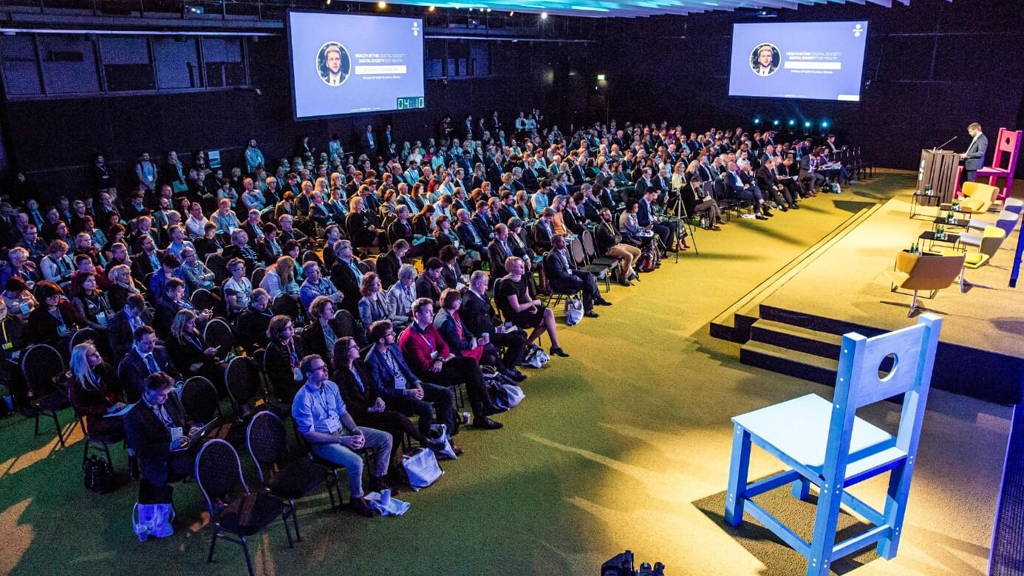Over 600 digital health experts and policy makers from Europe and across the globe gathered as part of the High-level conference 'Health in the Digital Society. Digital Society for Health' in Tallinn on 16-18 October 2017. The preliminary results of the EU public consultation on the future of digital health and care were presented and a Digital Health Society Declaration was announced.
According to Khalil Rouhana, Deputy Director-General of DG Connect at the European Commission, it’s vital to create opportunities for digital health and care': "We want EU citizens to have full access to their health data, this is our ambition." During a live interview (https://youtu.be/KFMVRl2G7ns), Khalil Rouhana discussed what people thought to be the main hurdles in Europe for implementing a digital health system, such as security, safety and privacy breaches.
European Commissioner for Health and Food Safety Vytenis Andriukaitis stressed that the Commission is committed to overcoming barriers to free movement of patients and data. He welcomed that the Estonian Presidency made EU cooperation to support digital health innovation a priority.
“At the informal Council meeting in July, health ministers articulated their willingness to be more ambitious on digital health and to collaborate more effectively on issues such as data security, cybersecurity and new software products for data sharing.” Andriukaitis added that that the momentum to converge our efforts seemed to have finally arrived. “Let us all work together with governments, health professionals, businesses, and researchers, but above all with the patients to make digital health in Europe a reality.”
The eHealth Tallinn conference focused on three main topics:
A joint declaration of over 100 European eHealth organisations was announced to accelerate digital innovation in healthcare. The Digital Health Society Declaration calls for concrete steps to develop eHealth in Europe and all stakeholders interested in the future of eHealth are expected to co-endorse it and to join the taskforces working on concrete actions and solutions.
Proposing solutions for overcoming these obstacles, the document emphasises the need for unified approaches to the development of data exchange infrastructure, raising people's awareness of the use of eHealth solutions and implementing the European Union Data Protection Regulation in a way that it does not create unnecessary obstacles to the free flow of data between member states.
According to Khalil Rouhana, Deputy Director-General of DG Connect at the European Commission, it’s vital to create opportunities for digital health and care': "We want EU citizens to have full access to their health data, this is our ambition." During a live interview (https://youtu.be/KFMVRl2G7ns), Khalil Rouhana discussed what people thought to be the main hurdles in Europe for implementing a digital health system, such as security, safety and privacy breaches.
EU citizens want access to digital healthcare
The preliminary results of the public consultation on the ‘Transformation of Health and Care in the Digital Single Market made it clear that EU citizens are asking for (better) access to digital healthcare and health data.- Over 90% agree that citizens should be able to manage their own data;
- Over 80% agree that sharing health data can help improve treatment, diagnosis & prevention of diseases;
- Some 60% of respondents say that they do not have access to digital health services. Of these people 2 out of 3 would like to have it;
- Respondents want the EC to take action for EU wide standards for electronic health records and interoperability based on open formats.
Coping with growing expectations
Estonian Minister for Health and Labour Jevgeni Ossinovski, said during a speech that European countries have made progress in developing eHealth, both in developing health information systems and in introducing digital prescriptions. “But this is not enough to cope with people’s growing expectations and to benefit from digital innovation in healthcare."European Commissioner for Health and Food Safety Vytenis Andriukaitis stressed that the Commission is committed to overcoming barriers to free movement of patients and data. He welcomed that the Estonian Presidency made EU cooperation to support digital health innovation a priority.
“At the informal Council meeting in July, health ministers articulated their willingness to be more ambitious on digital health and to collaborate more effectively on issues such as data security, cybersecurity and new software products for data sharing.” Andriukaitis added that that the momentum to converge our efforts seemed to have finally arrived. “Let us all work together with governments, health professionals, businesses, and researchers, but above all with the patients to make digital health in Europe a reality.”
The eHealth Tallinn conference focused on three main topics:
- Building citizen-driven demand in eHealth;
- eHealth supporting the value driven and sustainable health and social services;
- eHealth as a driver of innovation and economic development.
A joint declaration of over 100 European eHealth organisations was announced to accelerate digital innovation in healthcare. The Digital Health Society Declaration calls for concrete steps to develop eHealth in Europe and all stakeholders interested in the future of eHealth are expected to co-endorse it and to join the taskforces working on concrete actions and solutions.
Bottlenecks
The Declaration describes the bottlenecks that hamper the development of eHealth, such as:- The lack of people’s trust in e-services in Europe;
- The lack of interoperability between different information systems;
- The lack of a clear legal framework, and;
- The inadequate training of healthcare professionals.
Proposing solutions for overcoming these obstacles, the document emphasises the need for unified approaches to the development of data exchange infrastructure, raising people's awareness of the use of eHealth solutions and implementing the European Union Data Protection Regulation in a way that it does not create unnecessary obstacles to the free flow of data between member states.






